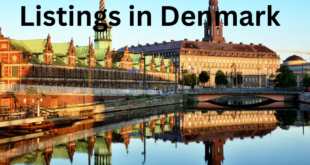The Danish job market is a topic of great interest for many people, especially those who are new to the country or plan to move there for work. Understanding the Danish job market is essential for anyone looking to secure a job in Denmark. This article will provide an overview of the Danish job market, including key industries, job seeking platforms, working culture, and employment law.
Denmark’s economy is stable and diverse, with big growth in key areas like information technology, healthcare, engineering, and green energy. The country has a high employment rate, with a low unemployment rate, making it an attractive destination for job seekers. However, it’s important to know how the Danish job market works before you start looking for a job.
This article will guide you through the Danish job market, providing you with the knowledge you need to succeed in your job search. Whether you’re a recent graduate, an experienced professional, or an expat, this article will help you navigate the Danish job market with confidence.
Key Takeaways
- Understanding the key industries in Denmark is essential for job seekers looking to secure a job in the country.
- Job seeking platforms are an important tool for anyone looking for employment in Denmark.
- Familiarizing yourself with Danish working culture and employment law is crucial for a successful job search.
Understanding the Danish Job Market
Denmark has a stable and diverse economy with significant growth in areas like information technology, healthcare, engineering, and green energy. The Danish job market is known for its high level of flexibility and work-life balance.
In Denmark, it is common for companies to offer flexible working hours and remote work options. The workweek is typically 37 hours, and employees are entitled to five weeks of paid vacation per year. In addition, Denmark has a strong welfare system that provides benefits like healthcare, childcare, and education.
The Danish job market is highly competitive, and it can be challenging for foreigners to find work without speaking Danish. However, there are many opportunities for international talent, especially in fields like IT, engineering, and life sciences.
To succeed in the Danish job market, it is essential to have a strong network and to be proactive in seeking out opportunities. It is also important to understand the Danish work culture, which values collaboration, open communication, and a flat hierarchy.
Overall, the Danish job market offers a unique combination of flexibility, work-life balance, and social benefits. While it can be competitive and challenging for foreigners, it is also full of opportunities for those who are willing to put in the effort to understand and navigate it.
Key Industries in Denmark
Denmark’s economy is highly diversified, and the country has a strong tradition of innovation and entrepreneurship. The Danish job market offers opportunities in various industries, including Information Technology, Pharmaceuticals, and Renewable Energy.
Information Technology
Denmark has a thriving IT industry that is highly innovative and fast-growing. The country is home to many successful startups and established companies that specialize in software development, cybersecurity, and e-commerce. Some of the leading IT companies in Denmark include:
- Trustpilot
- Unity Technologies
- Siteimprove
- Zendesk
- Tradeshift
The IT industry in Denmark is supported by a highly skilled workforce, a favorable business environment, and strong government support for innovation.
Pharmaceuticals
The pharmaceutical industry is another key sector in Denmark, with a long history of research and development in the field. The country is home to many world-class pharmaceutical companies, including:
- Novo Nordisk
- Lundbeck
- Leo Pharma
- Bavarian Nordic
- ALK-Abelló
Denmark’s pharmaceutical industry is supported by a highly skilled workforce, a strong research and development infrastructure, and a favorable business environment.
Renewable Energy
Denmark is a global leader in renewable energy, with a strong focus on wind power. The country is home to many companies that specialize in renewable energy technologies, including:
- Vestas Wind Systems
- Ørsted
- Danfoss
- Kamstrup
- Better Energy
Denmark’s renewable energy industry is supported by a favorable regulatory environment, government support for innovation, and a highly skilled workforce.
Overall, Denmark’s key industries offer a wide range of opportunities for job seekers, and the country’s strong tradition of innovation and entrepreneurship makes it an attractive destination for businesses and investors.
Job Seeking Platforms in Denmark
Denmark has a variety of job-seeking platforms that cater to both locals and international job seekers. Here are some of the most popular ones:
Workindenmark.dk
Workindenmark.dk is a job portal that is run by the Danish Ministry of Employment. It is primarily targeted at international job seekers and provides information on the Danish job market, work permits, and living in Denmark. The website also has a job search function that allows users to search for jobs by industry, location, and job type.
Jobindex.dk
Jobindex.dk is one of the largest job portals in Denmark, with over 40,000 job listings at any given time. The website has a user-friendly interface and allows job seekers to search for jobs by industry, location, and keywords. Jobindex.dk also offers a CV database that allows job seekers to upload their CVs and be contacted by potential employers.
Jobnet.dk
Jobnet.dk is a job portal run by the Danish Ministry of Employment. It is primarily targeted at Danish job seekers and provides information on the Danish job market, unemployment benefits, and job search strategies. The website also has a job search function that allows users to search for jobs by industry, location, and job type.
LinkedIn is a popular professional networking platform that is used by job seekers and employers all over the world. In Denmark, LinkedIn is a popular platform for job seekers to connect with potential employers and apply for jobs. Users can search for jobs by industry, location, and keywords, and can also set up job alerts to be notified when new jobs are posted.
Glassdoor
Glassdoor is a job search website that provides information on salaries, company reviews, and job listings. In Denmark, Glassdoor is a popular platform for job seekers to research potential employers and get a sense of the job market. Users can search for jobs by industry, location, and keywords, and can also read reviews of companies written by current and former employees.
Overall, these job-seeking platforms provide a wealth of information and job opportunities for both local and international job seekers in Denmark.
Working Culture in Denmark
Denmark is known for having a good work-life balance and a strong focus on employee rights. This is reflected in the country’s working culture, which places a high value on equality, flexibility, and trust.
Work-Life Balance
In Denmark, there is a strong emphasis on achieving a healthy work-life balance. This means that employees are encouraged to take time off when they need it, and that working hours are typically limited to around 37 hours per week. Additionally, Danish law guarantees a minimum of five weeks’ paid vacation per year, which can be supplemented by additional paid leave for public holidays and other special occasions.
Employee Rights
Denmark has some of the strongest employee rights in the world, with comprehensive laws and regulations designed to protect workers and ensure fair treatment. These include provisions for minimum wage, maximum working hours, and paid sick leave, among others. Additionally, Danish law guarantees the right to join a union and engage in collective bargaining, giving workers a powerful voice in shaping their own working conditions.
Overall, the working culture in Denmark is characterized by a strong commitment to fairness, equality, and work-life balance. This makes it an attractive destination for workers looking for a healthy and supportive work environment.
Danish Employment Law
In Denmark, the employment relationship is governed by the Employment Contracts Act, which sets out the basic rules for employment contracts. The Act covers issues such as working hours, holidays, notice periods, and termination of employment.
One of the key features of Danish employment law is the concept of “flexicurity.” This refers to a combination of flexible labor market policies and a comprehensive social safety net. The aim is to make it easy for employers to hire and fire workers, while also providing a high level of protection for employees who lose their jobs.
Another important aspect of Danish employment law is the collective bargaining system. Most employees in Denmark are covered by collective agreements negotiated between trade unions and employer organizations. These agreements set out the terms and conditions of employment, including wages, working hours, and benefits.
Employers in Denmark are also required to provide a safe and healthy working environment for their employees. This includes measures to prevent accidents and injuries, as well as protection against harassment and discrimination.
Overall, Danish employment law is designed to strike a balance between flexibility and security. Employers have a great deal of freedom to manage their workforce, but they are also expected to treat their employees fairly and provide a safe and healthy workplace.
Visa and Work Permit Requirements
Foreigners who want to work in Denmark need a work visa. The type of work visa required depends on the applicant’s qualifications, nationality, and length of stay. The work visa requirements are divided into three categories: EU/EEA citizens, Nordic citizens, and non-EU/EEA citizens.
For EU/EEA citizens, there is no need for a work permit or visa. They can work in Denmark without any restrictions. Nordic citizens can also work in Denmark without a work permit or visa.
Non-EU/EEA citizens need a work permit and visa to work in Denmark. The work permit is issued by the Danish Agency for International Recruitment and Integration (SIRI). The work permit is only issued if the applicant has a job offer from a Danish employer.
To obtain a work permit, the employer must first obtain a positive response from the Danish Agency for Labour Market and Recruitment (STAR). The employer must prove that there are no qualified Danish or EU/EEA citizens available for the job. The employer must also provide the applicant with a contract that meets the Danish labour market standards.
The work permit is issued for a maximum of four years and can be extended. The work permit holder can also bring their family members to Denmark.
It is important to note that the work permit does not give the applicant the right to reside in Denmark. They must apply separately for a residence permit.
Conclusion
In conclusion, the Danish job market offers a unique set of opportunities and challenges for both local and international job seekers. With a strong emphasis on work-life balance, flexible work arrangements, and a high standard of living, Denmark has become a popular destination for professionals looking to advance their careers.
However, it is important to note that the Danish job market can also be highly competitive, with a limited number of job openings and a preference for native Danish speakers. Therefore, it is essential for job seekers to be well-prepared, equipped with the necessary skills and qualifications, and willing to adapt to the local work culture.
Overall, understanding the Danish job market requires a combination of research, networking, and perseverance. By taking the time to learn about the local job market, building a strong professional network, and demonstrating a willingness to learn and adapt, job seekers can increase their chances of success in the Danish job market.
Frequently Asked Questions
What are the key characteristics of the Danish labor market?
The Danish labor market is characterized by a high level of flexibility and job security. It is also known for its strong social welfare system, which provides support for workers who are unemployed or otherwise unable to work.
What are the benefits of the flexicurity model in Denmark?
The flexicurity model in Denmark is designed to balance flexibility for employers with job security for employees. This model allows employers to easily hire and fire workers, while also providing a strong safety net for workers who lose their jobs.
What industries are in high demand in the Danish job market?
The Danish job market has a strong demand for workers in the healthcare, education, and technology sectors. Additionally, there is a growing need for workers in the renewable energy industry.
What are the working conditions like in Denmark?
Working conditions in Denmark are generally considered to be excellent. The country has a strong focus on work-life balance, with many employers offering flexible work arrangements and generous paid time off.
How does the Danish labor market differ from other European countries?
Compared to other European countries, the Danish labor market is known for its high level of flexibility and job security. Additionally, the country’s strong social welfare system sets it apart from many other European countries.
What policies have been implemented in Denmark to support the labor market?
Denmark has implemented a number of policies to support the labor market, including the flexicurity model, which balances flexibility for employers with job security for employees. Additionally, the country has a strong focus on education and training, which helps to ensure that workers have the skills they need to succeed in the job market.



